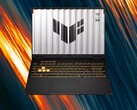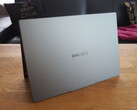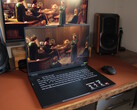We recently tested the Asus TUF Gaming A18. Given the TUF branding, we expected an 18-inch, heavy desktop-replacement meant for budget-conscious gamers. We were looking for solid gaming performance paired with the typical budget compromises. But the A18 ended up surprising us in a few ways.
For one, Asus prioritizes quiet, power-efficient operation in its default performance profile rather than sheer performance—something we break down in detail in in this article. On top of that, the TUF Gaming A18 is actually a bit slimmer than the Razer Blade 18 and comparatively lightweight for an 18-inch gaming laptop.
So as testing went on, we couldn’t help but wonder: Is Asus trying to make this big budget gamer appealing to creative users too? Traditionally, laptops in this category are much pricier, while budget models tend to rely on flashy LED-heavy designs and come in thick, heavy chassis.
What supports that idea
First, the market: more and more manufacturers are trying to pitch their high-performance gaming laptops to creative professionals as well. The trend is shifting away from heavy-handed RGB lighting toward cleaner, more understated designs that can appeal to both gamers and creators. And within the budget segment, there still aren’t many options that specifically target creative workloads, which could make this an interesting niche.
Second, some of the A18’s specs we mentioned above: Despite being an 18-inch machine, it’s surprisingly thin and relatively light, especially for a budget model this large. It also delivers very good battery life for its price category. The design is fairly minimalistic. Plus, its default performance mode favors quiet, efficient operation over maximum output. Only when switching to the louder Turbo mode does the A18 match competing models in performance. A manual mode is also available, letting users tweak TDP, PL values, and other parameters themselves.
Where we have doubts
The display. It isn’t bad, but it could be a limiting factor for creative work. Starting with the positives: after manual calibration, we were able to reduce the deviations (DeltaE values) in both grayscale and color reproduction to below 1—which is impressive. But the downside is that the panel only covers the sRGB color space; creators may expect wider gamut coverage. Brightness is limited to 300 nits, and the resolution sits at just 1,920 × 1,200. Still, within its supported color space, accuracy is excellent after calibration. Our calibrated ICC profile can be downloaded for free in the “Display” section of the full review.
A budget laptop can’t excel in every category, and the A18 does come with further compromises beyond the not-ideal display. The webcam only outputs Full HD and produces somewhat muddy images, though color accuracy is decent. We also weren’t fans of the stiff yet mushy-feeling click buttons on the touchpad. And the SSD isn’t particularly fast and suffers from thermal throttling under sustained load. An SD card ready is absent.
Conclusion
Whether intentionally or not, Asus has built a machine that could be appealing to budget-minded creatives—so long as they’re willing to accept a few limitations. In return, they get a relatively slim and lightweight 18-inch laptop with strong performance thanks to its RTX 5070, while still staying quiet and power-efficient.
The good news is that Asus has significantly lowered the price since our review, at least in Germany. The A18 originally launched at €2,199, but it’s now available for €1,799 on Amazon.de. On Amazon.com, you'll still have to pay $1.989. You’ll find our full review linked below.













